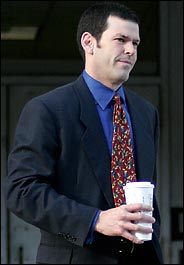 Tongues were wagging all over Houston this weekend as a result of Wall Street Journal reporter John Emshwiller’s exclusive interview ($) with former Enron treasurer and Andy Fastow confidant, Ben Glisan (excerpts of the interview are here).
Tongues were wagging all over Houston this weekend as a result of Wall Street Journal reporter John Emshwiller’s exclusive interview ($) with former Enron treasurer and Andy Fastow confidant, Ben Glisan (excerpts of the interview are here).
The theme of the interview is that Glisan initially deluded himself into thinking that he hadn’t done anything wrong while at Enron, but that he discovered his true self during his 4+ year prison term and came to terms with his criminality.
Emshwiller — whose coverage of the Enron case has been subject to serious conflict of interest issues before — laps up the morality play. Next thing you know, Glisan will be joining Sherron Watkins as a speaker on the “corporate governance reform” rubber chicken circuit.
However, as with almost everything pertaining to Enron, the true story about Glisan is more nuanced than meets the eye.
Glisan was a golden boy at Enron, a rising star in the management circles who Fastow plucked as his hand-picked replacement after running off Enron treasurer Jeff McMahon in early 2000. Contrary to the unsupported statements contained in the interview with Emshwiller, there are real questions as to whether Glisan did much of anything wrong in his duties as Enron’s treasurer.
However, it does appear that he used poor judgment in getting drawn into one of Fastow’s partnership deals in which he made a quick $1 million in mid-2001 on a nominal investment, although it remains unclear as to whether Glisan actually knew that he was engaged in any criminal wrongdoing in taking that return on his investment.
Nonetheless, later in 2001, a month or so before Enron filed its chapter 11 case, Glisan was ultimately canned as Enron’s treasurer because of his failure to disclose that investment in connection Enron’s failed merger negotiations with Dynegy, and so he quickly came under the scrutiny of federal investigators who were suspicious that Glisan’s $1 million return violated the “too good to be true rule” that prosecutors often rely upon to prosecute wealthy businesspeople.
For over a year and a half after being fired by Enron, Glisan continued to maintain to investigators that he had not engaged in any criminal conduct while at Enron. But soon after being indicted in 2003, Glisan — who had not made big money at Enron and was not financially capable of mounting a formidable defense to the criminal charges — copped his deal with the Enron Task Force and began serving his prison sentence.
The rest of the story is not particularly surprising. Glisan was treated roughly during his early days in prison and he quickly began negotiating with the Task Force prosecutors for better accommodations in return for testimony in other Enron-related criminal cases.
He ended up being one of the key witnesses in the Nigerian Barge trial, even though he was not directly involved in the transaction. Most of his testimony in that trial was hearsay of alleged statements made by other “co-conspirators” that was admitted as evidence under an exception to the hearsay rule that would have otherwise excluded such testimony. That testimony helped lead to the improper convictions of four former Merrill Lynch executives that were later overturned on appeal.
Glisan then parleyed his Nigerian Barge work into a transfer to a better prison, where he offered his testimony against former Enron executives Jeff Skilling and Ken Lay in return for liberal furloughs from prison to Houston, where he lived at home while working with prosecutors.
Although the Lay-Skilling jurors viewed him as an effective prosecution witness, there remain substantial questions whether Glisan was truthful during much of his testimony.
So, what to make of all this?
Simple morality plays are easier to write and understand, and certainly easier (and legally safer) to spin on the rubber chicken circuit. The truth in such matters is often far less certain and more difficult to understand, but it’s far more likely to prevent the injustices that have been heaped upon the four former Merrill Lynch executives, Jeff Skilling, Ken Lay, Kevin Howard and Chris Calger, just to name a few. As Ellen Podgor comments:
Although not the focus of [the Glisan interview], it is interesting to note that the risk and cost of trial weigh heavily in the decision to plea. Glisan, like Martha Stewart realized the value of “getting it over with,” and “moving on.” But is that the way the justice system is supposed to work?
